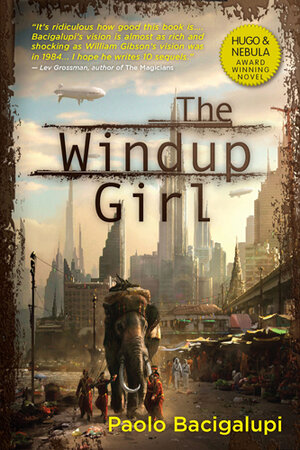''One way to answer these questions is to explore the possibilities via fiction. As we march slowly but relentlessly into a climate-changed future, many writers have taken up the challenge by feeling out the limits of its contours. The genre is called "cli-fi." At its worst, cli-fi is simply "collapse porn" replete with repeating narratives of the post-apocalypse.''
''At its best, however, thoughtful authors try to understand how our complex multitiered global civilization may respond to the challenges of a changing planet. Writer Paolo Bacigalupi lives on the "at-its-best" side of cli-fi. ''
ADAM FRANK NPR book review of THE WATER KNIFE
http://www.npr.org/sections/13.7/2015/08/11/431522774/the-water-knife-previews-a-future-drought-scenario
PLEASE NOTE:
in 2011 on his NPR blog, Adam Frank wrote an earlier piece that sort of telegraphed his ideas and what he would be writing in 2015!
see his 2011 npr piece on Paolo's WINDUP GIRL here:
http://www.npr.org/sections/13.7/2011/03/22/134758483/when-books-lead-the-windup-girl-takes-us-into-the-world-after-oil
EXCERPT from his 2011 blog:
hedline: When Books Lead: 'The Windup Girl' Takes Us Into The World After Oil
by Adam Frank
Fiction can be many things: a means to escape the world; a platform for weaving a finely crafted story; a way to explore lives and circumstance that define our humanity. Science fiction has the extra burden of creating entire worlds of technology and future history and hoping the reader finds them believable. At its best...... [HERE HE USES THAT ''AT ITS BEST'' PHRASE THAT APPEARS IN THE NEW 2015 PIECE ABOVE!]......science fiction can do what other genre's can not — help us imagine futures that may lie just before us.
Though I am a bit late in finding Paolo Bacigalupi's The Windup Girl (it was published in 2009) it belongs in that "at its best" category. While other authors have explored this territory before The Windup Girl presents us with a fully fleshed-out vision of the world after oil.
It's no secret that we are hurtling towards the cliff our dependence on fossil fuels. Soon — very soon — we will reach the peak of what can dredged up "cheaply" and be on our way down the long slide towards ... what? The carbon-based fuels which powered the exponential expansion of culture, capacity and population will be all but gone and we will be left to think long and hard on the meaning of "energy."
The Windup Girl takes on the world 150 years or so after "The Expansion" has ended. Unlike the Mad Max visions of global apocalypse, the world does not descend into a new Stone Age. Instead it faces "The Contraction", a long painful diminution in which traveling even 50 miles becomes a herculean task. World trade becomes a memory as society grasps for energy in any of its forms.
The strength of The Windup Girl's vision is that is does not imagine humanity falling back to barbarism but understands that without current flowing out of every wall people will find what ways they can. Computers still exist but they are run with treadles like sewing machines of a century ago. Humans once again have to supply the energy they need to get work of whatever form done. Beasts of burden reappear though now in the form of giant genetically modified elephants called Megatons. It's a fully realized world were Joules and Calories are now longer taken for granted but are the new coin of the realm.
The Windup Girl also brings two other facets of our near future to the fore. The climate has already changed and coastal cities lay under water or under the protection of tenuous systems of dykes and seawalls. Biodiversity and genetic engineering also dominate the story. Purposefully engineered plagues have wiped out much of the native food stores (and much of the population). "Calorie Men" like the story's protagonist search for hidden seed banks that companies like AgriGen can use to produce the next rice or wheat variant and hold the hungry world hostage.
Thirty years ago William Gibson published Neuromancer (co-) inventing cyberpunk, cyberspace and feeling out the first contours of the future we live in now. The Windup Girl has the same feeling as Gibson's work (the two are often compared). Our difficulty with the future is that we often cannot imagine its difference from the present as well its similarities. Paolo Bacigalupi deserves credit for seeing how a world without oil, a world contracted in the face of diminished availability of energy, might truly look work.

No comments:
Post a Comment